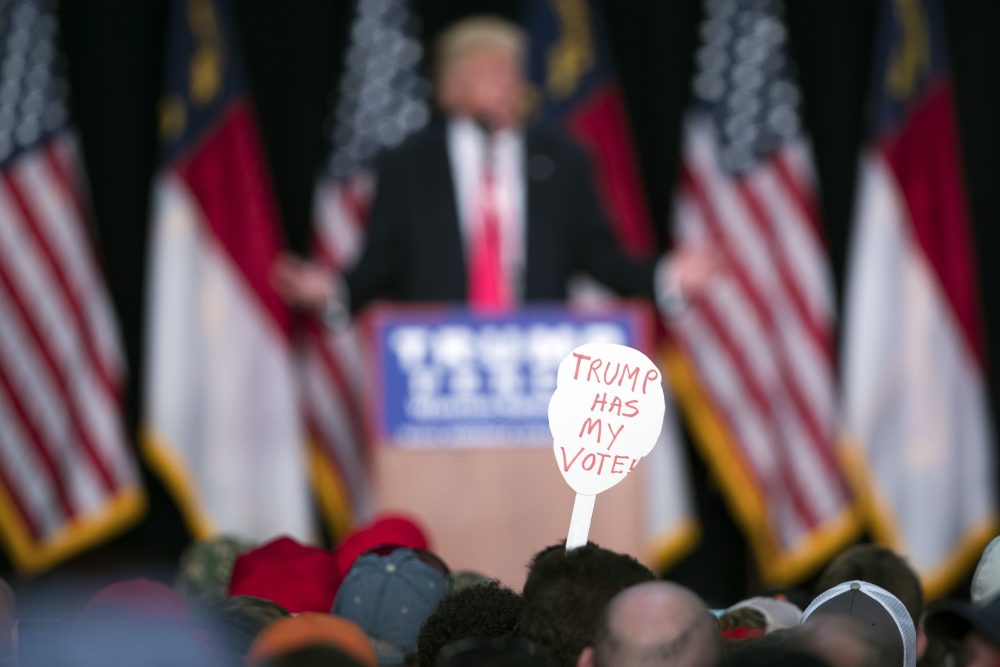Advertisement
Racial Resentment, Not Economics, Elected Trump

COMMENTARY
I hope it’s not rude to interrupt the Donald Trump victory celebration, but I have a confession: I was wrong. I gave Trump’s voters more sympathy than they deserve.
It’s hardly consoling that I was parroting conventional wisdom, which understood the Donald’s enthusiasts as the left-behind lunchpail set: workers without college degrees who couldn’t get traction in a merciless economy managed by indifferent elites. Sure, the billionaire’s vile rhetoric attracted bigots, but just as important, he was a carrot-coiffed middle finger, flipped to the out-of-touch Man on behalf of people struggling to make rent.
I bought into this narrative, arguing that we should help the needy, including Trump voters. I still think we should do that, but I’m no longer convinced that many Trump voters would be helped. It turns out that they aren’t so much “the desperate, the damned, the disinherited,” to crib Jesse Jackson’s old line, as they are whites in a lather over racial diversity, fanned perhaps by angst over changing social mores.
Trump’s supporters are better off than many other Americans. So what else drives them?
Let’s be clear: Attributing Trump’s victory solely to racism, as some liberals have, just shows why “dumb liberal” approaches cliché. The New York Times’s reliable Nate Cohn noted that some white, working-class enclaves that Trump carried or almost won, such as the Scranton-Wilkes Barre area of Pennsylvania and Youngstown, Ohio, had supported Barack Obama by double digits.
But there’s also ample evidence that, (a) Trump’s base, while blue collar, is doing better economically than you’d think, and (b) its real fear is the changing complexion of America. As we map out the next four years, we must compassionately but clearly convey that that second concern cannot have redress.
Trump voters aren’t as loaded as their hero. But their median household income of $72,000 gives them considerably more than the $62,000 national median. Buttressing that point, Gallup conducted 87,000 interviews before the election and found, in The Washington Post’s words, that “those who view Trump favorably have not been disproportionately affected by foreign trade or immigration” — Trump’s signature issues — "compared with people with unfavorable views of the Republican presidential nominee. The results suggest that his supporters, on average, do not have lower incomes than other Americans, nor are they more likely to be unemployed.”
Advertisement
This reinforced exit polls during the primaries, which found Trump voter’s incomes comparable to those of Ted Cruz’s supporters, and higher than Hillary Clinton’s and Bernie Sanders’s. To the degree the Trumpeters fret over economics, it might be on behalf of their children: Gallup found small increases in Trump support in areas where social mobility, generation to generation, is weak — and pronounced jumps in support in areas with high mortality rates among white people.
Clearly, though, Trump’s supporters are better off than many other Americans. So what else drives them? America has always seen Trumpish spasms of anger and fear during periods of immigration or values upheavals. Today, we’re living through both (the latter including gay marriage and the wake of feminism), and there’s evidence that the former especially tortures Trump’s core supporters.
A Pew study found that among Republicans who believed immigration “threatens traditional American customs and values,” 59 percent felt positively about Trump. Other research showed higher racial resentment among GOP primary voters for Trump than among John McCain’s and Mitt Romney’s in the previous two election cycles, leading a UCLA political scientist to conclude that Trump “is the first Republican in modern times to win the party’s presidential nomination on anti-minority sentiments.”
...we aren’t going to reverse the browning of America, and shouldn’t. It’s nothing to fear.
Other research confirms, as the FiveThirtyEight website wrote, that prejudice was one of the “distinguishing attitudes” of Trump voters in this year’s primaries.
The question stands: What’s to be done the next four years vis-a-vis the concerns of those who made Trump president-elect? Insofar as strengthening federal help for the needy and spurring the economy will benefit the stray Trump backer or her children, fine. Preventing illegal immigration to respect the rule of law is also appropriate, though clearly many voters don’t know the government was already doing that. But we aren’t going to reverse the browning of America, and shouldn’t. It’s nothing to fear.
